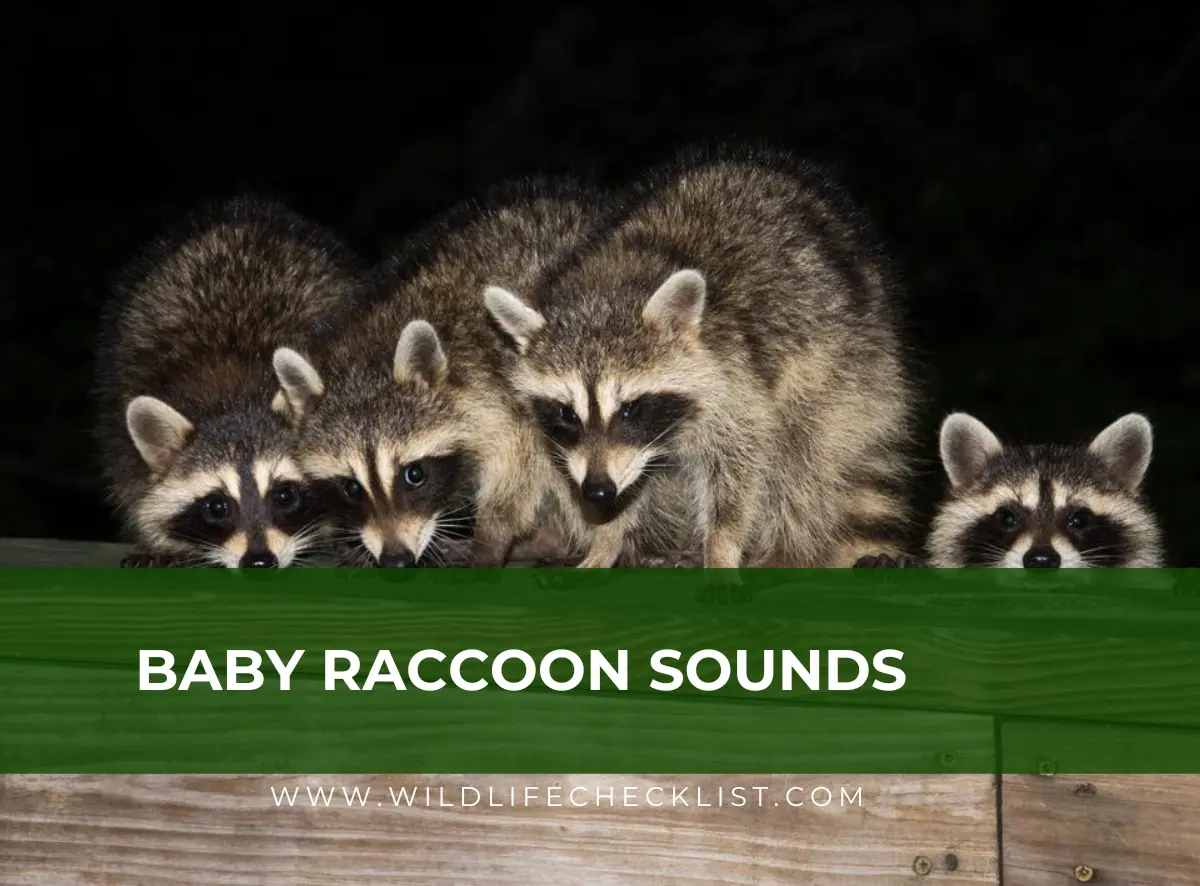Baby Raccoon Sounds (What do Baby Raccoons Sound Like?)

While wandering through the woods, you might have heard high-pitched noises; a baby raccoon could have made these sounds. The baby raccoons are typically born in the springtime and make quite a racket when they are first born.
Baby raccoon sounds are like the sounds of a bird or cat and are quite loud. Their sounds will start to sound more like adult raccoon sounds as they age.
Contents
Baby Raccoon Sounds and Meanings
If you’ve ever heard a baby raccoon’s sound, it is an experience you won’t soon forget. These cute creatures have high-pitched vocals, which are beautiful and haunting—little wonder they are often featured in nature documentaries and other recordings of wildlife animals.
It’s important to remember that raccoons are wild animals and shouldn’t be touched, even though the sound of a baby raccoon may be soothing to the ears.
It is better to keep your distance and observe any baby raccoons you may see up close. If you don’t know what to do, seek assistance from professional wildlife personnel.
Raccoon babies make various noises, including whining, chattering, and meowing. These sounds depend on their age, circumstances, and environment, and below are some baby raccoon sounds and their meanings.
Raccoons are nocturnal animals, and their activeness at night can make them emit sounds like:
1. Chittering and Mewling
The baby raccoons will make this sound when they are playful and excited. So, if you hear this sound from a group of baby raccoons, they are likely about to start or are playing.
They use these vocalizations at night because they rely on their auditory communications to stay connected to one another, especially their mother.
2. Scratching and Rustling
This sound does not deal with vocals, but the baby raccoons commonly use it to communicate. This involves activities like foraging, climbing, or exploring their environment, and they communicate perfectly well with themselves.
3. Purring sound
This is another common sound baby raccoons make, and they often make this sound when they are content and relaxed. If you hear a group of baby raccoons, make this sound, know there is a high probability they are doing fine and feeling well.
4. Screeching
The baby raccoons make this sound to indicate that something may be wrong. This noise is often made when they are scared or in pain. Always remember that they make most of these sounds at night because they are mostly active.
Remember that the sounds have their meanings and can vary depending on the event they used the sound for. When you understand what each sound means, it will help you know how to react per event.
Why do Baby Raccoons Make so Much Noise?
Before we answer why baby raccoons make so much noise, we should know if raccoon babies make noise. To answer that, we will say yes, raccoon babies make noise. Raccoons are generally very vocal; their noises and cries can be quite loud.
The mother raccoon will often sing to her babies while nursing them, and the baby raccoons will chirp in response. They used to cry to get her attention if their mother was not with them.
Raccoons are night animals, which means they are mostly active at night. So why do baby raccoons make so much noise? They make so much noise for a different number of reasons, and it can be that they are crying for food or attention, and they may also be playing.
Raccoons generally communicate with each other through their noises and sounds. Sometimes, they communicate through their body language and scent.
Baby Raccoon Sounds in the Wall
There is a probability that you hear strange noises within your walls, which may be the presence of raccoons. You can hear sounds like banging or loud scratching noises, or muffled chattering, and it can be a crying sound like a baby.
This may be the sound of baby raccoons playing around your walls. This is because there are times that the baby raccoon falls through a hole in the house insulation and finally ends up in your wall.
This is a very common event among baby raccoons, as their cry can make you feel uncomfortable, but you have to be cautious to avoid an attack.
Baby Raccoon Sound in the Attic
The raccoons use the attic as a safe place to make dens where they can give birth to their babies. Raccoons also use the attic to care for their young ones, believing it is safe. If a raccoon family is in your yard, you will frequently hear the sound of young raccoons in the attic.
Baby raccoons make distinct sounds in the attic, such as mewing, crying, whining, chittering, and chippering. You may mistake their sound for the birds chirping. When they see danger in the attic, they emit a high-pitched chirping sound. The sounds of thumping, rustling, dashing, scratching, and scurrying are also audible.
Baby Raccoon Screaming
Raccoon babies may also cry and scream, and they do so to attract their mother’s attention. They are known to always sound like every other baby animal and are often heard crying for a long time. They can scream, make sounds or noise to indicate hunger, or be cold or abandoned by their mother.
Keep your distance whenever you hear these screams at night. This is because getting close may give the mother raccoon the impression that you want to hunt her babies.
Screaming is a common sound from baby raccoons; you don’t have to worry. You may only want to get worried if the sound persists and no sign that the mother raccoon has attended to them.
If their screams don’t stop and are close to your yard, disturbing you from sleeping, you can try to scare them off. Scaring them off should also be done from afar so that raccoons don’t feel threatened, cornered, or attacked.
You can shake a soda can filled with coins, throw small rocks, or you can open an umbrella to scare them away as well.
The noises produced by raccoons are common at night because they are nocturnal animals. The urban environment does amplify their sounds, so if you hear baby raccoon sounds close to your house, it is important to respond responsively.
You will need to take the necessary precautions and probably involve wildlife professionals. So, for every sound made by raccoons, either the adult or the baby, they make the sound to communicate their emotions to themselves.




